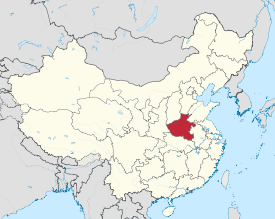Click to join the conversation with over 500,000 Pentecostal believers and scholars
Click to get our FREE MOBILE APP and stay connected
| PentecostalTheology.com



 Paul Hattaway, Henan: Inside the Greatest Christian Revival in History (United Kingdom: Piquant Editions/Asia Harvest 2021), 364 pages, ISBN 9781909281783.
Paul Hattaway, Henan: Inside the Greatest Christian Revival in History (United Kingdom: Piquant Editions/Asia Harvest 2021), 364 pages, ISBN 9781909281783.
Henan is book number five in Paul Hattaway’s series “The China Chronicles.” This series focuses on true accounts of Christianity in China; it is thus a work of history. The author points out that this book is not the same as the one he wrote in 2009 called Henan: The Galilee of China; the text of this current volume contains changes, improvements, and new material not found in the earlier book (page xvii).
In speaking of the history of Henan, Hattaway says that it extends back approximately 3,500 years (page 2). At one time Buddhism was popular (page 2). Perhaps surprisingly, during the course of its history thousands of Jews have lived in Henan (page 3), they have been in the province for 2,000 years (page 9). The population of the province is currently close to 100 million (pages vi, 7) and it has more Christians than any other province in China (page 7). This is not because the church has not suffered persecution, on the contrary, the church there has suffered much (page 7).
The author says that Christianity has been in Henan for more than 1,300 years (page 17). Though it has a large Christian population today, the gospel did not bear much fruit for most of this time, it was not until the 1970s that significant growth took place (page 17). The first to bring the Christian message to the province were Nestorians, they arrived in the AD 600s (page 18). In the late 1500s Jesuit (Catholic) missionaries arrived (page 19). Evangelical missionaries did not arrive in Henan until the late 1800s (page 23).

Henan Province, China. In 2020, total population was estimated at over 99 million people.
Image: Wikimedia Commons
As Hattaway recounts the history of Christianity in this province, the reader will encounter the names of many Christian workers, both men and women. Some of them were missionaries who came to China from other countries and some were national workers. Readers who have some knowledge of missions will recognize names like Jonathan Goforth and Marie Monson. The author gives considerable space to discussing the ministries of Jonathan and Rosalind Goforth (pages 55-70) and Marie Monsen (pages 99-116). Readers who are more familiar with the Chinese church will recognize the names of Brother Yun, Zhang Rongliang, and Peter Xu Yongze.
Christianity has been in Henan for more than 1,300 years.
One of the lesser-known workers who served in Henan was Norwegian missionary Daniel Nelson (pages 89-93). He served on the field for over thirty-five years and was martyred in Henan, as was his son, Bert (page 93). Nelson had another son, Daniel Jr., who also served in Henan (page 129). A lesser-known national worker would be a man called Elder Fu. He led many thousands of people to Christ (page 206). He was also used by the Lord to raise an eighteen-year-old girl to life (207-208), see the mention of it below.
In addition to individuals the author gives attention to some of the house church movements. These are the churches that are not part of the government approved Three-Self Patriotic church. The networks he writes about are: The Born-Again Movement (pages 155-178), The Nanyang Church (pages 198-217), The China Gospel Fellowship (pages 218-234), and the Fangcheng Church (pages 252-278).
The church has experienced tremendous growth. One of the factors that has contributed to this growth is the uncompromising commitment of the Chinese believers to stand for Jesus no matter what.
Like the earlier books in this series the text includes photographs. One interesting photo in this volume is of American Pentecostal missionary Dennis Balcombe in a coffin (page 260). He was not dead but this was how he was able to move from one place to another in Henan, the story behind the picture is told in the text (pages 259-260). The book also contains very detailed information that can be found in the charts located in the back of the book. This information consists of figures about population and Christian affiliation, by county and by city (pages 312-317).
Henan is a very balanced book in that it includes accounts about the hardships of the church in the province and the miracles that have taken place through the ministry of the church there. The church has experienced tremendous growth. One of the factors that has contributed to this growth is the uncompromising commitment of the Chinese believers to stand for Jesus no matter what. The book contains some very notable accounts of people being raised from the dead. An eighteen-year-old girl was raised after having been dead for three days, this took place after hours of worship and prayer (pages 207-208). In another very powerful account a man was raised from the dead. A Chinese believer went to a morgue three days in a row to pray for a dead man, after the third day the man came back to life (pages 213-217). Interestingly enough, the man who prayed for the dead man did not see the miracle happen, he heard about it later (page 216).
The Lord has, and is, building His church around the world. He is doing this even in lands where the church faces opposition and persecution.
The Lord has, and is, building His church around the world. He is doing this even in lands where the church faces opposition and persecution, China is clearly one of the places where He is very active. The books in the “China Chronicles” series bear this out. Henan, like the other books in the series, is very readable and is packed with information. I think that the books in this series, both now and in the future, will take their place as definitive works on the history of Christianity in China.
Reviewed by John Lathrop
Read an excerpt: Marie Monsen – The Mother of the Chinese House Churches
Asia Harvest’s page about Henan: https://www.asiaharvest.org/henan-inside-chinas-revival-a-new-book-by-paul-hattaway




Anonymous
Henan is book number five in Paul Hattaway’s series “The China Chronicles.” This series focuses on true accounts of Christianity in China; it is thus a work of history. The author points out that this book is not the same as the one he wrote in 2009 called Henan: The Galilee of China; the text of this current volume contains changes, improvements, and new material not found in the earlier book (page xvii).
In speaking of the history of Henan, Hattaway says that it extends back approximately 3,500 years (page 2). At one time Buddhism was popular (page 2). Perhaps surprisingly, during the course of its history thousands of Jews have lived in Henan (page 3), they have been in the province for 2,000 years (page 9). The population of the province is currently close to 100 million (pages vi, 7) and it has more Christians than any other province in China (page 7). This is not because the church has not suffered persecution, on the contrary, the church there has suffered much (page 7).